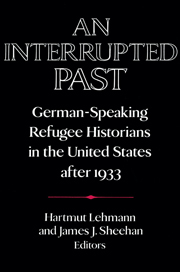Book contents
- Frontmatter
- Introduction
- PART I: Introduction
- 1 German and American Historiography in the Nineteenth and Twentieth Centuries
- 2 German Historiography during the Weimar Republic and the Émigré Historians
- 3 The Historical Seminar of the University of Berlin in the Twenties
- PART II: Introduction
- 4 Refugee Historians in America: Preemigration Germany to 1939
- 5 “Uphill Work”: The German Refugee Historians and American Institutions of Higher Learning
- 6 Everyday Life and Emigration: The Role of Women
- 7 The Special Case of Austrian Refugee Historians
- 8 Schicksalsgeschichte: Refugee Historians in the United States
- 9 German Historians in the Office of Strategic Services
- 10 The Refugee Scholar as Intellectual Educator: A Student's Recollections
- PART III: Introduction
- 11 German Émigré Historians in America: The Fifties, Sixties, and Seventies
- 12 The Americanization of Hajo Holborn
- 13 Explaining History: Hans Rosenberg
- 14 Ernst Kantorowicz and Theodor E. Mommsen
- 15 Refugee Historians and the German Historical Profession between 1950 and 1970
- Conclusion
- Index
8 - Schicksalsgeschichte: Refugee Historians in the United States
Published online by Cambridge University Press: 05 January 2013
- Frontmatter
- Introduction
- PART I: Introduction
- 1 German and American Historiography in the Nineteenth and Twentieth Centuries
- 2 German Historiography during the Weimar Republic and the Émigré Historians
- 3 The Historical Seminar of the University of Berlin in the Twenties
- PART II: Introduction
- 4 Refugee Historians in America: Preemigration Germany to 1939
- 5 “Uphill Work”: The German Refugee Historians and American Institutions of Higher Learning
- 6 Everyday Life and Emigration: The Role of Women
- 7 The Special Case of Austrian Refugee Historians
- 8 Schicksalsgeschichte: Refugee Historians in the United States
- 9 German Historians in the Office of Strategic Services
- 10 The Refugee Scholar as Intellectual Educator: A Student's Recollections
- PART III: Introduction
- 11 German Émigré Historians in America: The Fifties, Sixties, and Seventies
- 12 The Americanization of Hajo Holborn
- 13 Explaining History: Hans Rosenberg
- 14 Ernst Kantorowicz and Theodor E. Mommsen
- 15 Refugee Historians and the German Historical Profession between 1950 and 1970
- Conclusion
- Index
Summary
To date, the research agenda of emigration studies has been dominated by the study of professionally successful academic refugees and their intellectual contributions to their host countries. Following this trend, research on German-speaking émigré historians in the United States after 1933 has centered on well-known historians who published extensively and held prestigious academic positions. About fifteen refugee historians have become household names to members of the American and German historical professions. Hajo Holborn, Felix Gilbert, and Hans Rosenberg, to name but a few of the most notable refugee historians, have been celebrated with Festschriften, academic honors, media interviews, and serious analyses of their historical works.
Researchers' focus upon the famous refugees has in many cases allowed the literature on emigration to become a literature of celebration. Anthony Heilbut's Exiled in Paradise is exclusively concerned with the brilliant and colorful émigrés whose names are virtually synonymous with the 1933 wave of emigration; not surprisingly, pictures of Albert Einstein, Hannah Arendt, and Bertolt Brecht grace the cover of his book. Lewis Coser, in his book Refugee Scholars in America. has short biographies of some fifty outstanding refugee scholars. Included are four of the best-known refugee historians: Hajo Holborn, Felix Gilbert, Hans Rosenberg, and Paul Oskar Kristeller. Coser also writes on two economic historians: Alexander Gerschenkron and Fritz Redlich.
- Type
- Chapter
- Information
- An Interrupted PastGerman-Speaking Refugee Historians in the United States after 1933, pp. 116 - 135Publisher: Cambridge University PressPrint publication year: 1991
- 2
- Cited by



